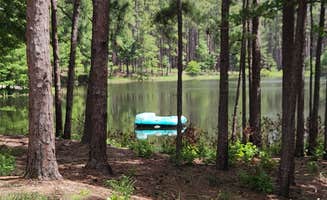Primitive camping near Village Mills, Texas offers opportunities for solitude in East Texas woodlands. Sexton Pond Dispersed camping area sits within the Angelina National Forest, part of the four national forests in Texas. Summer temperatures frequently exceed 90°F with high humidity, making spring and fall the preferred camping seasons for many visitors.
What to do
Fishing opportunities: Sexton Pond provides fishing access with specific timing considerations. "Down a hard packed gravel road. A few potholes but nothing major. Nice spot in the trees. There are a few fire pits spread out. We were the only ones here," notes Jennifer M. about Sexton Pond Dispersed.
Hiking trails: Multiple trail systems traverse the nearby wilderness areas. The Upland Island Wilderness Area contains over 13,000 acres of protected forest with hiking routes ranging from easy to moderate difficulty. Upland Island Wilderness Area permits backcountry camping throughout the wilderness boundary.
Wildlife observation: The forests surrounding Village Mills host diverse wildlife including white-tailed deer, wild turkey, and numerous bird species. Early morning and dusk provide optimal viewing times. Spring migration brings additional bird watching opportunities.
What campers like
Solitude and space: Dispersed camping areas near Village Mills often provide isolation from other campers. "Down a hard packed gravel road. A few potholes but nothing major. Nice spot in the trees. There are a few fire pits spread out. We were the only ones here," reports Jennifer about her stay at Sexton Pond.
Natural surroundings: The pine forests create natural shade and windbreaks at many dispersed sites. The East Texas woodland ecosystem provides habitat for native plants and wildlife year-round.
Affordability: Free camping options make Bouton Lake Camp and similar dispersed areas attractive alternatives to developed campgrounds. Budget-conscious campers can access primitive camping near Village Mills without reservation or camping fees.
What you should know
No facilities: All dispersed camping areas require complete self-sufficiency. Pack in all water, food, and supplies, and pack out all trash. No potable water, toilets, or trash receptacles exist at any of these locations.
Road conditions: Access roads to Hunter Camp on Forest Road 217A and other dispersed sites may become difficult after heavy rainfall. High-clearance vehicles are recommended for accessing most primitive camping areas near Village Mills.
Fire restrictions: Seasonal burn bans frequently affect East Texas, particularly during summer and drought conditions. Always check current fire restrictions with the local ranger district before planning campfires.
Limited cell service: Most primitive camping areas have spotty or nonexistent mobile coverage. Download maps and information before arrival, and plan emergency communications accordingly.
Tips for camping with families
Wildlife precautions: Teach children proper food storage to avoid attracting wildlife. All food should be secured in vehicles overnight at sites like Sexton Pond. Black bears occasionally range through these forests, though sightings remain rare.
Water needs: Each person requires approximately 1 gallon of water per day for drinking and basic hygiene when staying at Upland Island Wilderness Area or similar locations without water sources. Additional water for cleaning and cooking should be factored into planning.
Weather preparation: East Texas experiences rapid weather changes, particularly during spring and fall. Pack layers and rain gear even during clear forecasts. Summer thunderstorms can develop quickly with little warning.
Tips from RVers
Site selection: Scout potential sites before committing, especially with larger rigs. Many primitive areas near Village Mills have unmarked low branches or uneven terrain that challenge larger vehicles.
Generator use: National Forest guidelines typically restrict generator hours to 8am-10pm. Consider solar alternatives when staying at Sexton Pond Dispersed to maintain battery power without noise.
Leveling challenges: Most dispersed camping areas feature natural, ungraded surfaces. Bring substantial leveling blocks and wheel chocks for RV stability on uneven ground.
Supply runs: The nearest reliable services are approximately 10 miles from most primitive camping areas. Stock accordingly or plan trips into town for resupply, as no convenience stores exist near these camping locations.


